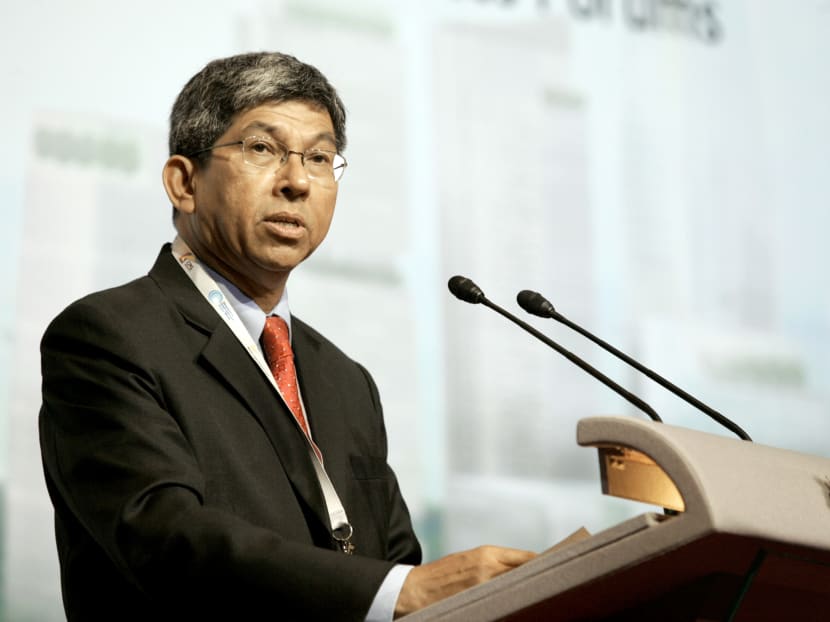Desire for Malay president cuts across community: Yaacob
SINGAPORE — While younger Malays have grown up with meritocracy as the basis of how society is organised, and appear reluctant to see a “circuit breaker” in the Elected Presidency (EP) to ensure minority representation, the desire to see a Malay President cuts across the community, said Minister-in-charge of Muslim Affairs Yaacob Ibrahim.
SINGAPORE — While younger Malays have grown up with meritocracy as the basis of how society is organised, and appear reluctant to see a “circuit breaker” in the Elected Presidency (EP) to ensure minority representation, the desire to see a Malay President cuts across the community, said Minister-in-charge of Muslim Affairs Yaacob Ibrahim.
Many from the community would, in closed-door discussions, “raise their hands in wanting to see a Malay President”, said Dr Yaacob, who was speaking at the debate on proposed changes to the EP on Monday (Nov 7).
The Constitutional Commission, given the task of reviewing aspects of the EP, had proposed a mechanism to reserve elections for a particular minority race if it had not been represented for five consecutive terms, a period that stretches three decades.
Rising to share his thoughts on the “psyche” of the Malay community and the “historical burden” of being perceived as an “underachieving community”, Dr Yaacob said the Malay community, to a greater degree than other communities, looked forward to seeing one of their own recognised for excellence and leadership.
In 1968, when his eldest brother, Mr Mohd Ismail Ibrahim, was named Singapore’s first Malay President’s Scholar, the Paya Lebar airport was “swamped by Malays” to see him off, he recalled.
On the other hand, his brother’s schoolmate, Mr Christopher Catherasoo, who also bagged the scholarship, was accompanied only by his immediate family.
“The truth is that we do not have many Malays in key positions of power and leadership. Having one being a President is not just nice but timely,” said Dr Yaacob.
The desire is particularly strong among older Malays, having lived under Singapore’s first and only Malay President, the late Mr Yusof Ishak, who died in office more than four decades ago.
But timeliness “cannot, and must not, be the reason why we should have a Malay President”.
“The Malay candidate must meet the same exacting standards as demanded of candidates from the other communities,” said Dr Yaacob.
The minister said that he had been concerned initially that making provisions that would enable a Malay candidate to hold the highest office would be construed as the Government going out of its way to help a minority community “that has lagged behind”.
“I was worried that a Malay candidate may not be able to command the respect of all Singaporeans,” Dr Yaacob said.
Hence, the qualifying criteria for candidates must never be compromised, he stressed. “If we are to carry out the proposed tweak to ensure minority representation, we must do so because it is good for Singapore and Singaporeans, and not just for the minority communities, and certainly not for the Malay community. The candidate, minority or otherwise, must meet the same, exacting requirements, and therefore be seen to be good for all Singaporeans,” he said.
He noted that surveys show that despite efforts at forging a common Singaporean identity, people still tend to “drift towards their own kind”.
“I have come to recognise that we need such policies to avoid the pitfalls of other societies that have ignored the human tendency to behave in tribal ways and insisted on seeing the world as they sincerely believed it to be. These societies have suffered for it,” he said.
Deputy Prime Minister Teo Chee Hean, in his speech in Parliament, acknowledged concerns that special arrangements to ensure multiracial representation in the Elected Presidency scheme detract from meritocracy.
But meritocracy-related concerns “lose force” if the eligibility criteria apply to candidates of all ethnic groups, he said.
Beyond the President’s custodial functions, the symbolic role is also important. “There is a real concern the members of minority groups may not be elected to the Presidency for long periods. This will undermine the President’s vital role as the symbol of our multi-racial nation,” he said.
The five-term timeline struck a good balance, given that an overly lengthy hiatus may not ensure that the presidency was accessible to various races, and the general principle would be to reserve the election for the racial group that has had a longer hiatus from office, he added. ADDITIONAL REPORTING BY VALERIE KOH









